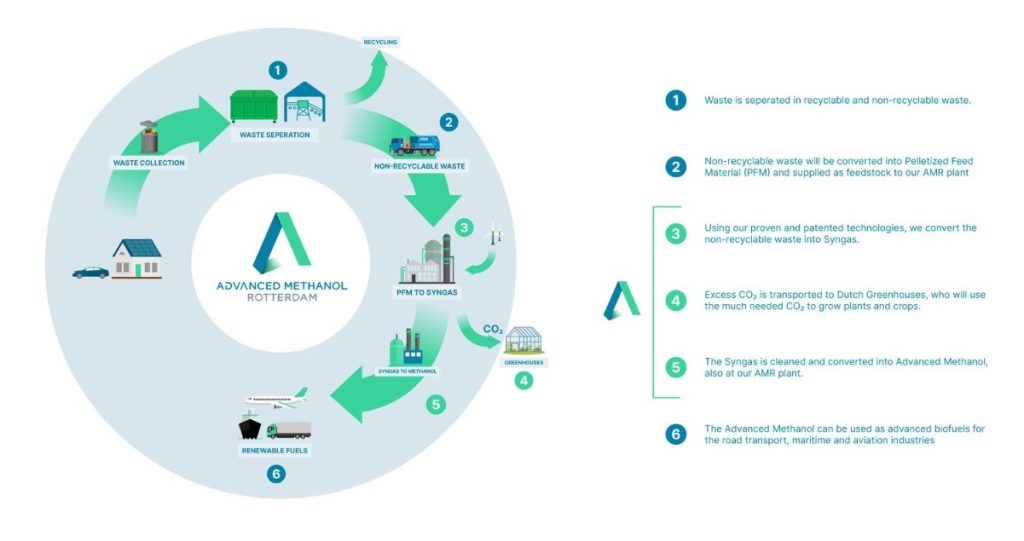GIDARA Energy, a Dutch energy company, and the Port of Rotterdam will develop an advanced biofuels facility in the Netherlands called Advanced Methanol Rotterdam (AMR).
As disclosed, located in the port of Rotterdam, the plant will convert non-recyclable waste into advanced methanol. The advanced methanol achieves CO2 emission reductions outlined in the Renewable Energy Directive II and Fit-for-55 frameworks.
What is advanced methanol?
Advanced methanol is a versatile renewable transportation fuel that, amongst others, can be used in the road transport, marine and aviation sectors, helping these sectors to reduce their carbon emissions and become more sustainable.
Last year, GIDARA Energy announced Advanced Methanol Amsterdam, a state-of-the-art renewable fuels facility that will act as a blueprint for AMR. The two facilities will be identical, utilising GIDARA’s patented High-Temperature Winkler (HTW) technology, which converts non-recyclable waste to renewable fuels.
Advanced Methanol Rotterdam will achieve a reduction of 350,000 tonnes of CO2 equivalents of GHG emissions per year. It will produce approximately 90,000 tonnes of renewable methanol yearly by converting 180,000 tonnes of local non-recyclable waste.
The facility is scheduled to start Detail Engineering and Construction in H1 2023, when permits have been received, and start production of renewable methanol in 2025.
In order to meet the demand for cleaner fuels, GIDARA Energy needs to grow aggressively. With this announcement, we show how dedicated we are to taking on the environmental and waste challenges we are all facing. As we have standardised our design and modularised our application, we are able to replicate the facility in Amsterdam directly in Rotterdam.
…Wim van der Zande, CEO GIDARA Energy, said.
According to the CEO, the location, quality of infrastructure and access to a broad network of partners were leading factors in deciding the location of our second facility. The cooperation with the Port of Rotterdam makes it possible to develop the integrated product value chain from waste to fuel and other valuable by-products.

In addition, the Port of Rotterdam’s strategy is to facilitate the existing industries in reducing their carbon footprint as well as attracting new businesses that fit in the Port Authority’s ambition to be a CO2-neutral port and industrial complex in 2050.
We welcome GIDARA Energy’s decision to set up this state-of-the-art facility for the production of sustainable methanol in our port. The Advanced Methanol Rotterdam plant matches very well with our long-term vision for the transition of the industry in the port
…said Allard Castelein, CEO Port of Rotterdam, adding also that the development shows the importance of clear and reliable governmental policies regarding the energy transition. In this case, regulations regarding the use of sustainable transport fuels stimulate companies to invest in plants like this.
In the meantime, Chariot Ltd, an Africa focused transitional energy company, has signed a Memorandum of Understanding (MoU) with the Port of Rotterdam International in order to establish supply chains and import green hydrogen and ammonia into the Netherlands and northwest Europe.
































































